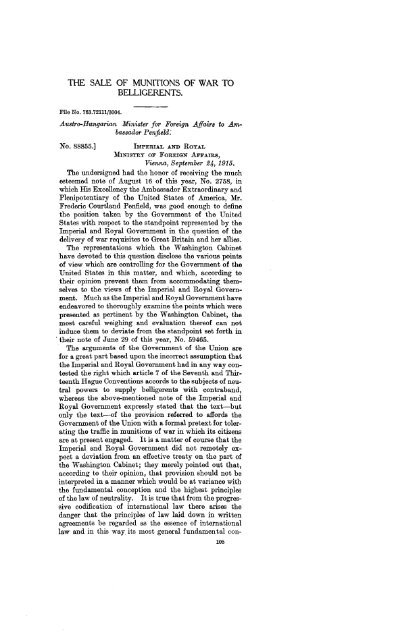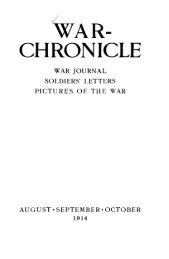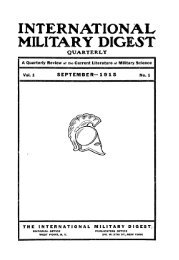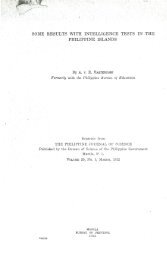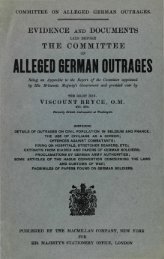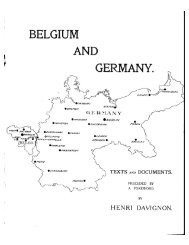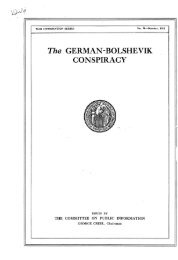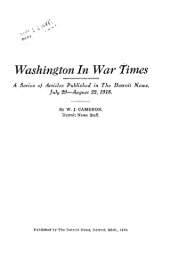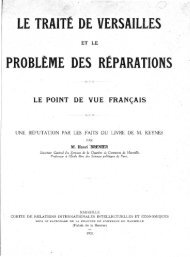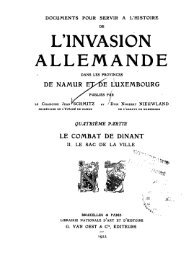- Page 1:
EUROPEAN WAR No. 4. # [Printed and
- Page 4 and 5:
From and to whom. The German Ambass
- Page 6 and 7:
No. From and to whom. No. 5021 3475
- Page 8 and 9:
No. 375 427 1011 1027 1039 1064 LIS
- Page 10 and 11:
8 LIST OF PAPEBS. PART XV—Continu
- Page 12 and 13:
10 LIST OF PAPERS: PART XV—Contin
- Page 14 and 15:
12 LIST OF PAPEBS. PART XV—Contin
- Page 16 and 17:
14 LIST OF PAPEES. PART XVII—Cont
- Page 18 and 19:
16 LIST OF PAPEBS. 4909 3809 4919 4
- Page 20 and 21:
18 LIST OF PAPEBS. No. From and to
- Page 23 and 24:
MARITIME DANGER ZONES AND MINE AREA
- Page 25 and 26:
MARITIME DANGER ZONES. 23 trade to
- Page 27 and 28:
MABITIME DANGER ZONES. 25 this work
- Page 29 and 30:
MABITIMB DANGER ZONES. 27 Article 1
- Page 31 and 32:
File No. 763.72/1141. MARITIME DANG
- Page 33 and 34:
File No. 763.72/1174. MARITIME DANG
- Page 35 and 36:
MARITIME DANGER ZONES. 33 founded i
- Page 37 and 38:
MARITIME DANGER ZONES. 35 of German
- Page 39 and 40:
MARITIME DANGEB ZONES. 37 E. PARTIC
- Page 41 and 42:
File No. 763.72/1549. MABITIME DANG
- Page 43 and 44:
MARITIME DANGER ZONES. 41 No. 274 o
- Page 45 and 46:
MARITIME DANGER ZONES. 43 "Many app
- Page 47 and 48:
Pile No. 841.801/53. MABITIME DANGE
- Page 49 and 50:
File No. 841.801/80. MARITIME DANGE
- Page 51 and 52:
MARITIME DANGER ZONES. 49 of these
- Page 53:
PART II. INTERFERENCES BY BELLIGERE
- Page 56 and 57: 54 INTERFERENCES WITH MAILS. 4. The
- Page 58 and 59: 56 INTERFERENCES WITH MAILS. cases
- Page 60 and 61: 58 INTERFERENCES WITH MAILS. 26. Af
- Page 63: PART III. BRITISH ADMIRALTY INSTRUC
- Page 66 and 67: 64 INSTRUCTIONS FOR ARMED MERCHANT
- Page 68 and 69: 66 XEBiKtroiroaB wm AEKDEB MUECHaka
- Page 71 and 72: THE "DECLARATION OF LONDON.' File N
- Page 73 and 74: THE- " DECLARATION 03? LONDON." 71
- Page 75 and 76: THE "DECLARATION OF LONDON." 73 hav
- Page 77 and 78: THE "DECLARATION OF LONDON." 75 war
- Page 79: File No. 763.72112/3089. THE " DECL
- Page 83 and 84: PAPERS RELATING TO PASSAGE OF BRIT
- Page 85: PART VI. BRITISH RESTRAINTS ON COMM
- Page 88 and 89: 86 BEITISH EESTEAINTS ON COMMBBOE.
- Page 90 and 91: 88 BRITISH RESTRAINTS ON COMMERCE.
- Page 92 and 93: 90 BRJMSH BESTBAlifffS ON COMSiEECE
- Page 94 and 95: 92 BRITISH RESTRAINTS ON COMMERCE.
- Page 96 and 97: 94 BRITISH RESTRAINTS ON COMMERCE.
- Page 99 and 100: THE ECONOMIC CONFERENCE OF THE ALLI
- Page 101 and 102: ECONOMIC CONFERENCE OE THE ALLIES.
- Page 103 and 104: ECONOMIC CONFERENCE OF THE ALLIES.
- Page 105: PART VIII. THE SALE OF MUNITIONS OF
- Page 109 and 110: SALE OF MUNITIONS OF "WAR TO BELLIG
- Page 111: SALE OF MUNITIONS OF WAR TO BELLIGE
- Page 115 and 116: STATEMENT BY ITALY REGARDING HER DE
- Page 117: ITALY'S WAR DECLARATIONS. 115 this
- Page 121 and 122: DISPLAY BY NAVAL VESSELS OF DISTIN
- Page 123 and 124: Pile No. 763.72/2411. DISPLAY OF DI
- Page 125: PART XL STATUS OF BELLIGERENT SUBMA
- Page 128 and 129: 126 STATUS OF BELLIGERENT SUBMARINE
- Page 131: PART XII. THE TORPEDOING OF THE BRI
- Page 134 and 135: 132 CASE OF THE PERSIA. File No. 84
- Page 136 and 137: 134 CASE OF THE PERSIA. plosion. No
- Page 138 and 139: 136 CASE OF THE PEESIA. it I found
- Page 140 and 141: 138 CASE OF THE PERSIA. over the sp
- Page 142 and 143: 140 CASE OF THE PERSIA. of an Austr
- Page 144 and 145: 142 G.4SE 0F THE HEBSIA. warning gi
- Page 147: PART XIII. TORPEDOING OF THE ITALIA
- Page 150 and 151: 148 CASE OF THE ANCONA. and occupie
- Page 152 and 153: 150 CASE OF THE ANCONA. belonging t
- Page 154 and 155: 152 CASE OF THE ANCONA. The telegra
- Page 156 and 157:
154 CASE OF THE ANCONA. us at about
- Page 158 and 159:
156 CASE OF THE ANCONA. and for the
- Page 160 and 161:
158 CASE OF THE ANCONA.. [Inelosure
- Page 162 and 163:
160 CASE OF THE ANCONA. was 12.30 a
- Page 164 and 165:
162 CASE OF THE ANCONA. I saw the s
- Page 166 and 167:
164 CASE OP THE ANCONA. At ten fort
- Page 168 and 169:
166 CASE OP THE ANCONA. [Inclosure
- Page 170 and 171:
168 CASE OF THE ANCONA. I do not kn
- Page 172 and 173:
170 CASE OP THE ANCONA. No. Flag fi
- Page 174 and 175:
172 CASE OF THE ANCONA. 2d Interrog
- Page 176 and 177:
174 CASE OF THE ANCONA. Answer to l
- Page 178 and 179:
176 GASE OF THE ANCONA. Ambassador
- Page 180 and 181:
178 CASE OF THE ANCONA. in the cond
- Page 182 and 183:
180 CASE OF THE ANCONA. of the subm
- Page 184 and 185:
182 CASE OF THE ANCONA. the sinking
- Page 187 and 188:
ATTACK ON THE AMERICAN STEAM SHIP
- Page 189 and 190:
CASE OF THE PETROLITE. 187 between
- Page 191 and 192:
CASE OF THE PETROLITE. 189 provisio
- Page 193 and 194:
CASE OF THE PETROLITE. 191 to the f
- Page 195 and 196:
CASE OP THE PETROLITE. 193 serted a
- Page 197 and 198:
CASE OF THE PETROLITE. 195 now the
- Page 199 and 200:
CASE OF THE PETROLITE. 197 That, as
- Page 201:
CASE OF THE PETROLITE. 199 In the o
- Page 205 and 206:
VARIOUS AMERICAN VESSELS OR FOREIGN
- Page 207 and 208:
File No. 300.115Ev2/17. SUBMARINE W
- Page 209 and 210:
SUBMARINE WARFARE. 207 No one advis
- Page 211 and 212:
SUBMARINE WAICFABE. 209 seemed to k
- Page 213 and 214:
SUBMARINE WABFARE. 211 The captain
- Page 215 and 216:
SUBMARINE WARFARE. 213 We finished
- Page 217 and 218:
SUBMARINE WABFABE. 215 We reported
- Page 219 and 220:
SUBMARINE WARFARE. 217 [Inclosure 5
- Page 221 and 222:
SUBMARINE WARFARE. 219 In testimony
- Page 223 and 224:
SUBMARINE WARFARE. 221 Listertief s
- Page 225 and 226:
File No. 300.115G95/ SUBMARINE WARF
- Page 227 and 228:
SUBMARINE WARFARE. 225 as accessibl
- Page 229 and 230:
SUBMARINE WARFARE. 227 water. Crew
- Page 231 and 232:
SUBMARINE WARFARE. 229 [Inclosure 1
- Page 233 and 234:
SUBMARINE WARFARE. 231 and filled w
- Page 235 and 236:
SUBMARINE WARFARE. 233 leaving Live
- Page 237 and 238:
File No. 300.115 N.27/17. SUBMARINE
- Page 239 and 240:
File No. 861.857Im7/ SUBMARINE WARF
- Page 241 and 242:
SUBMARINE WAEFAEE. 239 side of the
- Page 243 and 244:
SUBMARINE WARFARE. 241 back to our
- Page 245 and 246:
Pile No. 763.72/2692. SUBMARINE WAR
- Page 247 and 248:
Pile No. 763.72/2862. SUBMARINE WAR
- Page 249 and 250:
SUBMARINE WARFARE. 247 [Incloaure.]
- Page 251 and 252:
SUBMARINE •WARFARE. 249 [Inclosur
- Page 253 and 254:
SUBMARINE WARFARE. 251 German subma
- Page 255 and 256:
SUBMARINE WARFARE. 253 There were o
- Page 257 and 258:
SUBMARINE WARFARE. 255 I saw a subm
- Page 259 and 260:
File No. 300.115L22/1. SUBMARINE WA
- Page 261 and 262:
S13BMARINE WARFARE. 259 ships absol
- Page 263 and 264:
SUBMARINE WARFARE. 261 flag, was pa
- Page 265 and 266:
SUBMARINE WABFABE. 263 from October
- Page 267 and 268:
File No. 841.857/195. SUBMARINE WAR
- Page 269 and 270:
SUBMARINE WARFARE. 267 A Note Verba
- Page 271 and 272:
File No. 800.857/183a. SUBMARINE WA
- Page 273 and 274:
SUBMARINE WABFABE. 271 ordinance; t
- Page 275 and 276:
SUBMARINE WARFARE. 273 lipville, ne
- Page 277 and 278:
File No. 300.115C42/3. SUBMABINE WA
- Page 279 and 280:
SUBMARINE WARFARE. 277 and steering
- Page 281 and 282:
SUBMARINE WARFARE. 279 nearest the
- Page 283 and 284:
SUBMARINE WARFARE. 281 ing food to
- Page 285 and 286:
SUBMARINE WARFARE. 283 [Incloaure 1
- Page 287 and 288:
SUBMARINE WARFARE. 285 S. S. Laconi
- Page 289 and 290:
SUBMARINE WARFARE. 287 "How many pa
- Page 291 and 292:
SUBMARINE WARFARE. 289 [Incloaure 2
- Page 293 and 294:
SUBMARINE WARFARE. 201 o'clock; and
- Page 295 and 296:
File No. 300.115 C 49/1. SUBMARINE
- Page 297 and 298:
File No. 300.115 H 34. SUBMARINE WA
- Page 299 and 300:
SUBMARINE WARFARE. 297 room. Two ot
- Page 301 and 302:
STJBMAEINB WAKFABE. 299 owners Amer
- Page 303:
Wilfred Name of ship. Begistry. Nor
- Page 307 and 308:
PEACE OVERTURES OF THE CENTRAL POWE
- Page 309 and 310:
PEACE OVERTURES OP CENTRAL POWERS.
- Page 311 and 312:
PEACE OVERTUEES OF CENTRAL POWERS.
- Page 313 and 314:
PEACE OVERTURES OF CENTRAL POWERS.
- Page 315 and 316:
PEACE OVERTURES OF CENTRAL POWERS,
- Page 317 and 318:
PEACE OVERTURES OF CENTRAL POWEKS.
- Page 319:
PEACE OVERTURES OF CENTRAL POWERS.
- Page 323 and 324:
SUGGESTIONS CONCERNING THE WAR MADE
- Page 325 and 326:
PRESIDENT'S SUGGESTIONS TO BELLIGER
- Page 327 and 328:
PRESIDENT'S SUGGESTIONS TO BELLIGER
- Page 329 and 330:
PRESIDENT'S SUGGESTIONS TO BELLIGER
- Page 331 and 332:
PRESIDENT'S SUGGESTIONS TO BELLIGER
- Page 333 and 334:
PRESIDENT'S SUGGESTIONS TO BELLIGER
- Page 335 and 336:
PRESIDENT'S SUGGESTIONS TO BELLIGER
- Page 337 and 338:
PRESIDENT'S SUGGESTIONS TO BELLIGER
- Page 339 and 340:
PRESIDENT'S SUGGESTIONS TO BELLIGER
- Page 341 and 342:
PRESIDENT'S SUGGESTIONS TO BELLIGER
- Page 343 and 344:
PBESIDENT'S SUGGESTIONS TO BELLIGER
- Page 345 and 346:
PRESIDENT'S SUGGESTIONS TO BELLIGER
- Page 347 and 348:
PRESIDENT'S SUGGESTIONS TO BELLIGER
- Page 349:
PART XVIII. PROPOSALS OF THE DE FAC
- Page 352 and 353:
350 MEXICAN PEACE PROPOSALS. "'Keas
- Page 354 and 355:
352 MEXICAN PEACE PBOPOSALS. that i
- Page 357:
PART XIX. DEPORTATION OF CIVILIANS
- Page 360 and 361:
358 DEPORTATION OF CIVILIANS FROM B
- Page 362 and 363:
360 DEPORTATION OF CIVILIANS FROM B
- Page 364 and 365:
-362 DEPORTATION OF CIVILIANS FROM
- Page 366 and 367:
364 DEPOBTATTON OF CIVILIANS FKOM B
- Page 368 and 369:
366 DEPORTATION OF CIVILIANS FROM B
- Page 370 and 371:
368 DEPOETATION OF CIVILIANS FROM B
- Page 372 and 373:
370 DEPORTATION OF CIVILIANS EROM B
- Page 374 and 375:
372 DEPORTATION OE CIVILIANS FROM B
- Page 377:
PART XX. WITHDRAWAL OF THE AMERICAN
- Page 380 and 381:
378 WITHDRAWAL OF MINISTER WHITLOCK
- Page 383 and 384:
PRESIDENT WILSON'S ADDRESS OF JANU
- Page 385 and 386:
PBESIDENT'S ADDRESS. 383 I only tak
- Page 387 and 388:
PRESIDENT'S ADDKESS. 385 constant,
- Page 389:
PART XXII. AMERICAN PRISONERS OF WA
- Page 392 and 393:
390 AMERICAN PRISONERS ON THE YARRO
- Page 394 and 395:
392 AMERICAN PRISONERS ON THE YAREO
- Page 396 and 397:
394 AMERICAN PRISONERS ON THE YARRO
- Page 398 and 399:
396 AMERICAN PRISONERS ON THE YARRO
- Page 400 and 401:
398 AMERICAN PRISONERS ON THE YARRO
- Page 403:
PART XXIII. SEVERANCE OF DIPLOMATIC
- Page 406 and 407:
404 SEVERANCE OF RELATIONS WITH GER
- Page 408 and 409:
406 SEVERANCE OF RELATIONS WITH GER
- Page 410 and 411:
408 SEVERANCE OF RELATIONS WITH GER
- Page 412 and 413:
410 SEVERANCE OF RELATIONS WITH GER
- Page 414 and 415:
412 SEVERANCE OF RELATIONS WITH GER
- Page 416 and 417:
414 SEVERANCE OF RELATIONS WITH GEE
- Page 418 and 419:
416 SEVERANCE OF BELATIONS WITH GER
- Page 421:
PART XXIV. DECLARATION OF WAR AGAIN
- Page 424 and 425:
422 DECLARATION OF WAB AGAINST GERM
- Page 426 and 427:
424 DECLARATION OF WAE AGAINST GERM
- Page 428 and 429:
426 DECLARATION OF WAB AGAINST GERM
- Page 430 and 431:
428 DECLARATION OF WAR AGAINST GERM
- Page 432 and 433:
430 DECLARATION OF WAS AGAINST GERM
- Page 434 and 435:
432 DECLARATION OF WAS, AGAINST GER
- Page 437 and 438:
SEVERANCE OF DIPLOMATIC RELATIONS B
- Page 439 and 440:
SEVERANCE OF RELATIONS WITH AUSTRIA
- Page 441 and 442:
SEVEBANCE OP BELATIONS WITH AUSTBIA
- Page 443 and 444:
.SEVERANCE OF RELATIONS WITH AUSTRI
- Page 445 and 446:
SEVERANCE OP RELATIONS WITH AUSTRIA
- Page 447:
SEVERANCE OF RELATIONS WITH AUSTRIA
- Page 451:
SEVERANCE OF DIPLOMATIC RELATIONS B


